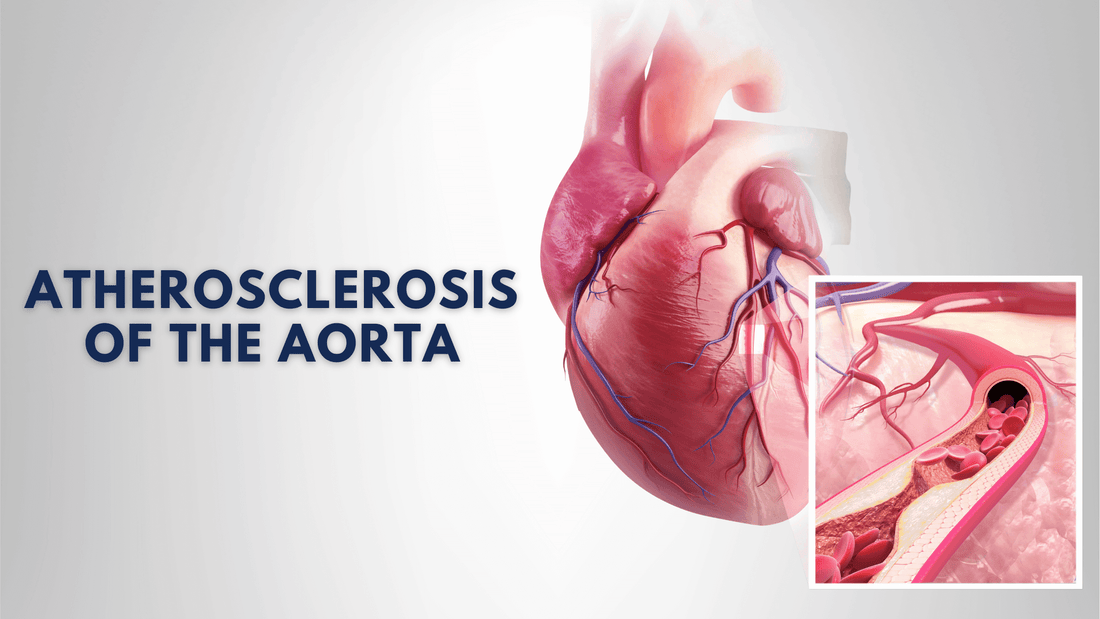Atherosclerosis of the aorta is a serious form of cardiovascular disease that develops when plaque builds up inside the body’s largest artery. This condition, often referred to as aortic atherosclerosis or abdominal aortic atherosclerosis, can quietly progress for years before symptoms appear. Because the aorta carries blood to nearly every organ, plaque buildup here can affect the entire body.
In this article, we’ll explore what atherosclerosis of the aorta is, the most common symptoms, the main risk factors, and how to support your heart and arteries through lifestyle choices and natural approaches.
What Is Aortic Atherosclerosis?
Aortic atherosclerosis happens when fatty deposits, calcium, and other materials form plaque inside the walls of the aorta. As the plaque thickens, it narrows the artery, restricting blood flow and forcing the heart to work harder.
Unlike smaller arteries, the aorta is responsible for supplying blood to the brain, kidneys, legs, and vital organs. When atherosclerosis of the abdominal aorta develops, the risks can be severe, including aneurysms, ruptures, and strokes.

Symptoms of Atherosclerosis of the Aorta
The early stages of aortic atherosclerosis often show no obvious signs. As the condition progresses, symptoms may i include:
- Chest or back pain
- Shortness of breath
- Fatigue and reduced stamina
- Weak pulse in the legs or feet
- Numbness, cramps, or pain in the legs while walking
- Cold feet or poor circulation in the lower body
-
Episodes of dizziness or fainting
If you experience three or more of these symptoms, it’s important to see your doctor for proper evaluation.
Risk Factors for Developing Aortic Atherosclerosis
Several lifestyle and genetic factors can increase the likelihood of atherosclerosis of the aorta. The most common include:
Smoking or long-term exposure to secondhand smoke
- Unhealthy diet, especially one high in junk food and processed sugar
- Lack of regular exercise or prolonged sedentary lifestyle
- Chronic stress and high anxiety levels
- Poor sleep habits, getting too few hours of rest consistently
- Obesity and type 2 diabetes
- High blood pressure that strains the arteries
- Genetic predisposition or family history of heart disease
-
Aging, which naturally stiffens arteries over time
When these factors combine, the chances of abdominal aortic atherosclerosis increase significantly.
How Is Atherosclerosis of the Abdominal Aorta Diagnosed?
Doctors may use CT scans, MRIs, ultrasounds, or other imaging tests to detect atherosclerosis of the abdominal aorta. Regular check-ups are essential, especially if you have several risk factors or a family history of arterial disease.
Treatment Options for Aortic Atherosclerosis
Medical treatment for atherosclerosis of the aorta may include medications to manage blood pressure or diabetes, lifestyle changes, and in severe cases, surgical procedures to repair or replace damaged parts of the aorta.

Natural Ways to Support Arterial Health with Aortic Atherosclerosis
Alongside medical care, many people look for ways to support arterial health naturally. Helpful strategies include:
- Eating a diet rich in whole foods, vegetables, lean proteins, and healthy fats
- Staying active with daily exercise such as walking, cycling, or swimming
- Practicing stress-reducing activities like meditation, mindfulness, or prayer
- Prioritizing consistent, high-quality sleep

Some individuals also explore a long-term protocol designed to support cardiovascular wellness and arterial health. One such option is the HeartStrong Complete Bundle Extra Strength —a program developed over years to provide targeted nutritional support with ingredients like Vitamin D3, Vitamin K2, Nattokinase, and Serrapeptase.
This protocol is not intended to treat or cure disease, but rather to provide comprehensive support for those seeking to maintain circulation, promote arterial flexibility, and strengthen overall cardiovascular health.
Customer Experiences with Heart Strong and Aortic Atherosclerosis Support
Many Heart Strong customers have shared how they feel after making lifestyle changes and adding natural support:
- “Good news!! My cardiologist just did a heart catheterization and told me I have ZERO plaque buildup. Heartstrong works!!!” – Rick Williams
- “I broke down in tears. I got my test results back and it showed that all my arterial blockages had disappeared. Thank you!” – MJW
- “I’m blown away. I can feel myself getting healthier. I just finished a four mile walk. I haven’t been able to do that in years.” – H.F.
- “It’s a miracle!!! I dropped my Coronary Artery Calcium score from 800 to 200 in just twelve months.” – JM
- “Had a cardiac stress test yesterday… My cardiologist told me: ‘Your heart is strong, your ejection fraction is normal, you are doing great. See you in 6 months.’ This was from the same doctor who, a year ago, told my children to enjoy what time they had with their father. I credit Heart Strong products with the tremendous improvement in my cardiovascular and overall health.” – John D., MD
-
“Really important find. I am now stocking this at my practice.” – Dr. D
Take Action on Atherosclerosis of the Aorta
If you are concerned about aortic atherosclerosis or atherosclerosis of the abdominal aorta, don’t wait to take action. Healthy lifestyle changes and natural support may help you feel stronger and protect your arteries for the future.
Learn more and get started today with the HeartStrong Complete Bundle Extra Strength.
Disclaimer
These statements have not been evaluated by the FDA. No information here is meant to diagnose, treat, cure, or prevent any disease. No supplements offered are meant to diagnose, treat, cure, or prevent any disease.

